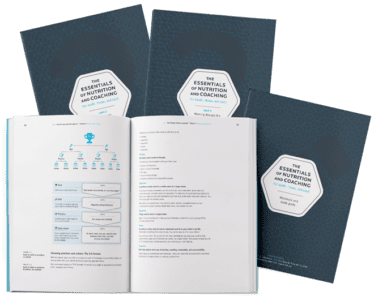Chapter 5
Intermittent fasting for weight loss: A deep dive
Intermittent fasting offers several weight loss benefits, and lot of people swear by it. Intermittent fasting may preserve metabolism during weight loss while also defusing cravings. But it can also disrupt hormones and appetite—and lead to bouts of overeating. Let’s explore the ins and outs of doing intermittent fasting for fat loss.
Key concepts
- Intermittent fasting offers several upsides. But it can also disrupt hormones and appetite—and lead to bouts of overeating.
- More fasting isn’t always better for fat loss. What’s important: Finding the right IF balance for your body.
- Fasting works great for some people—and horribly for others. And it’s not necessarily better than conventional caloric restriction.
When people look to intermittent fasting to help them with “weight loss,” they’re usually talking about “fat loss.”
After all, most people don’t want to lose muscle, water, organs, bone, or any of the other components that make up our total body weight.
So from here on out, we’ll refer to weight loss as fat loss.
And when it comes to fat loss, there’s a universal formula that goes like this: eat fewer calories than you burn.
Despite what some people might say, that formula holds true no matter what diet you try—whether it’s keto, calorie counting, or IF.
Here’s the thing: eating fewer calories than you burn isn’t easy.
For most diets, being hungry is part of the process.
And that kinda sucks.
IF might help solve this problem, at least for some people.
With IF, people can eat normally during non-fasting periods, and less during fasting periods—without having to battle their hunger 24-7.
It also offers other potential fat loss benefits, ranging from boosting metabolism to better hunger and fullness cues.
In this chapter, we’ll dive into the science of how IF could help people seeking to lose weight, exploring:
- The fat loss benefits of IF
- How IF affects metabolism and hormones
- The risks of IF
- How to maximize the benefits of IF while minimizing the risks
The benefits of intermittent fasting for fat loss
IF offers many upsides—as well as a few potential downsides. We’ll start with what works.
Fat loss benefit #1: Intermittent fasting may keep metabolism going.
Usually, when we eat less energy than we need, our bodies respond with several metabolic adaptations.
It’s a cruel irony: The more we try to lose fat, the harder it becomes.
For instance:
- We get hungrier, and are less satisfied when we do eat.
- We want to move around less.
- We expend less energy on normal metabolic activities.
- We don’t repair or recover as well.
- Levels of many hormones drop, including sex, thyroid, and many anabolic (growth-promoting) hormones.
- We notice our digestion slowing down.
All of these changes mean we use less energy overall, making fat loss more challenging.
IF varies how much energy we take in day to day, which, in theory, might prevent or decrease many of these metabolic adaptations. It probably works best if we don’t reduce our energy too much, or too often.
That said, there’s a lot of variation among people.1
This was true of the personal experiences of Precision Nutrition team members Krista Scott-Dixon, PhD (our director of curriculum), and John Berardi, PhD (our co-founder). When they experimented with a variety of IF protocols, they sometimes had a win (getting leaner and feeling awesome), and sometimes didn’t (looking exhausted and feeling run down).
Fat loss benefit #2: Intermittent fasting may defuse some of our cravings.
The same circuit in our brains that produces natural painkillers, the endogenous opioid system, is also involved in deciding which foods we perceive as tasty and appealing, and whether we overeat when we feel deprived.
We can knock this system out of whack by harshly restricting and controlling our food intake. In other words, if we restrict eating too much for too long, we’re jonesing for our food drug of choice, or finding it hard to eat normally.
With a little blip of IF restriction here and there, however, we’ll probably be fine.
Fat loss benefit #3: Intermittent fasting can teach you a ton about hunger.
The thought of fasting for a large chunk of the day (or even a whole day) is kinda scary for a lot of people.
But fasting teaches us that hunger is just a feeling. It’s not an emergency—and fasting can help you prove that to yourself. Once you get better acquainted with what happens when you get hungry, you’ll be able to sense into your hunger, and be a better judge of when and how much to eat.
The cons of intermittent fasting for fat loss
Okay, so we just told you about a few pros. But IF also poses a few risks that you should know about if fat loss is your goal.
Con #1: While some fasting can help, a lot of fasting may backfire.
Maybe you’ve heard of the hormesis effect. A little shot of a disruptive stimulus (such as a workout) may make us healthier or better, but a sustained, overzealous program of that stimulus may destroy us.
The same is true with fasting. If we push energy restriction too far for too long, we start to see problems. Especially if we combine it with other stressors, ranging from hard training to a toxic work environment.
We’ve explained just two of those problems below.
Thyroid and adrenal disruption
The hypothalamus and pituitary gland in the brain are highly sensitive to stress. They secrete hormonal signals that affect the activity of “downstream” organs such as the thyroid gland, adrenal glands, and gonads (ovaries or testes).
These feedback loops are known, respectively, as the HPT, HPA, and HPG axes.
With prolonged stress or under-nutrition, the hypothalamus and pituitary gland may tell downstream organs to reduce their hormonal production, leading to problems like low thyroid function (which slows metabolism) or low sex hormone production.
Women’s bodies seem to be much more sensitive than men’s to energy and nutrient restriction. This is especially true for women who are already active and/or have relatively lower levels of body fat.
So, if you’re female, approach IF with caution, and change course immediately if you notice disruptions to your normal hormonal cycles.
(For more details on this, see: Does intermittent fasting work for women?)
Appetite disruption
Another issue: When we eat less (and/or lose body fat), particularly over a long period of time, the hormones and peptides that govern appetite, satiety, and nutrient sensing shift.
- Leptin, insulin, pro-opiomelanocortin (POMC), and alpha-melanocyte-stimulating hormone (αMSH) go down.
- Neuropeptide Y (NPY), orexin, and ghrelin go up.
End result: We feel hungrier, and are less satisfied when we do eat.
So if you’re training hard, restricting nutrients, struggling with disordered eating, and/or have other stressors in your life…
IF might actually make things worse.
Bottom line: The goal with IF is to find a balance—enough fasting to see the benefits, but so much that you start to feel the drawbacks.
Con #2: For some people, the benefits of intermittent fasting may be offset by overeating.
Not everyone reacts to fasting the same way.
Some people eat normally during their non-fasting windows. And some eat less.
Other people? They eat more. A heck of a lot more.
That’s because, in some people, IF increases production of hunger hormones (such as ghrelin), and decreases production of satiety hormones (such as leptin).
That means they’re hungrier when it’s time to eat, and it’s harder for them to feel satisfied.
Bottom line: If you end up feasting after every fast, you may not lose as much (or any) fat.
Con #3: Morning fasts can lead to late-night snacks.
Many of our clients struggle with overeating in the evening.
When we explore this, we often find that they’re skipping breakfast. Some are rushing through lunch, too.
Others don’t eat much protein, healthy fats, or fiber earlier in the day. If they eat breakfast, it’s a bowl of cereal, or nothing at all; lunch might be a sad sandwich.
By the time dinner rolls around, they’re starving and it’s hard to control their appetite. After dinner, it’s snacky time and they find themselves raiding the pantry with a seemingly uncontrollable drive to eat.
When we ask these clients to eat a breakfast with protein, healthy fats, fiber, and some fruits or vegetables, and do the same at lunch, often their evening overeating magically disappears, or at least is drastically reduced.
So should we eat breakfast or not?
The answer, of course: it depends—on many different factors.
The only reliable way to know whether you’re a breakfast person: self experimentation. Try eating breakfast every day for a while. Then try skipping it, all the while keeping notes on what happens. If you discover through experimentation that fasting in the morning suits you— and you’re not overeating later—then keep doing it.
On the other hand, if you find out that skipping breakfast is a one-way trip to Snacktown in the evening, then you’ll want to make some changes to your morning routine.
Bottom line: What matters most (as with every recommendation in this ebook) is that you follow the evidence your body gives you.
How to find your intermittent fasting fat loss sweet spot
It’s clear that some IF can work wonders for people trying to lose fat, but too much can backfire.
So how exactly do you find that just-right place, where you’re fasting enough to reap the benefits, but not so much that you’re suffering the side effects?
We’ll explore that question in-depth in chapter 8. For now, consider easing into fasting by eating less—but not zero—on your “fasting” days. When people eat up to 20 to 25 percent of their normal daily energy intake, we’ve found they don’t feel as deprived, and they’re more likely to stick to the plan.
For a 200-pound (91 kilogram) person, this might mean:
- 4 days per week, they eat a “normal” intake, perhaps 3000 Calories daily.
- 3 days per week, they eat 25 percent of that, or 750 Calories.
Over time, this averages out to around 2035 Calories per day, or about 10 times their body weight in daily calories.
That’s a recipe for a nice, relatively steady fat loss progression, and likely something that an average person could sustain, especially with coaching and support.
References
Click here to view the information sources referenced in this article.



